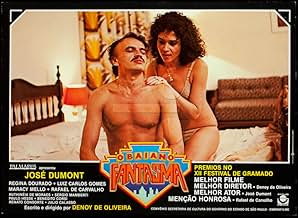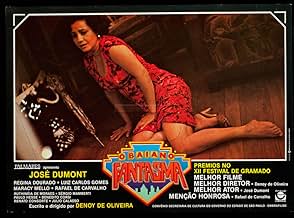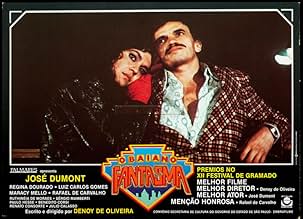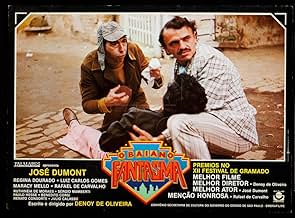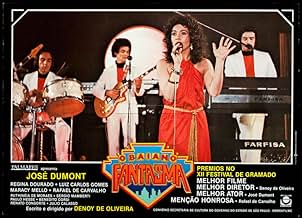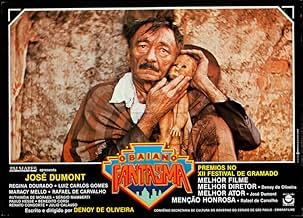Lambusca, nordestino em São Paulo, vira cobrador de agiotas. Em uma de suas cobranças, um dos devedores morre subitamente e ele é acusado de assassinato. Perseguido, busca inocência e sobrev... Ler tudoLambusca, nordestino em São Paulo, vira cobrador de agiotas. Em uma de suas cobranças, um dos devedores morre subitamente e ele é acusado de assassinato. Perseguido, busca inocência e sobrevivência na dura realidade das ruas de São Paulo.Lambusca, nordestino em São Paulo, vira cobrador de agiotas. Em uma de suas cobranças, um dos devedores morre subitamente e ele é acusado de assassinato. Perseguido, busca inocência e sobrevivência na dura realidade das ruas de São Paulo.
- Prêmios
- 5 vitórias no total
Enredo
Você sabia?
- CuriosidadesFinal film of Rafael de Carvalho. He passed away three years before the film's release. At the end credits there's a dedicatee on him.
- Trilhas sonorasEu Sei que Vou te Amar
(uncredited)
Written by Antonio Carlos Jobim and Vinicius de Moraes
Performed by Regina Dourado
Avaliação em destaque
To quote Godard, "To best way criticize a movie is to make another movie". Since I cannot do that, I must assume director Denoy de
Oliveira did exactly that when he made "O Baiano Fantasma" as he told almost the same story as the one told in "O Homem que Virou Suco". And
he used the same leading actor José Dumont as a simple Northeast man who moves to São Paulo to pursuit a better life condition but instead he
gets involved in some shady business and gets confused as a criminal hunted by the police. Godard isn't wrong with that idea as it has been
proven that similar themes are often reworked, sometimes it works and other times it doesn't. This 1984 film was wronged in almost everything
that the 1980 film succeed.
By turning Lambusca (Dumont) story into a wildly crazed comedy without some drama and relevance to life, we simply don't care about anything that happens to him or the other characters. It's not as if the situations were unbelievable or ridiculous, neither a case that it tries to make fun of things that aren't funny. It's simply not funny and it's hard to get a decent laugh at everything. The only amusing bits revolve on whenever the jurídico ("legal") team is called upon. They're not lawyers, they are a team from the debt collectors scheme that is used whenever they need to roughen-up with all the customers who won't pay their protection fees. Lambusca ends up working for such team and because of that threat a man end up dying from a heart-attack and trouble ensues.
João Batista de Andrade's film "O Homem que Virou Suco" is not mentioned lightly by me. It offers a humored yet dark, realistic and almost fantastic view of the countless problems faced by Northeast migrants living in São Paulo. It shows how gritty the cultural clashes are and makes many valid statements about the different regions. It's very memorable and fun to watch, unlike this forgettable film that avoids the cultural clashes and just gives stereotypical characters all the time, even the ones who are from São Paulo are mere charicatures of some variation that doesn't feel right, others aren't presented in a good manner, like the Italian merchant played by Renato Consorte (him and the tough guys singing some Italian song were funny). And Dumont was brilliant in that movie; here he's just okay but Gramado folks liked him enough to grant him a Best Actor award.
I liked the presence of Rafael de Carvalho (in one of his final films) as the lunatic character he plays is someone we feel sorry, as he felt duped by all the progress from the big city and went literally crazy simple because some authority took away his "peixeira" (big knife). "Back in my city, everything was solved under the knife. Here, they said the government would take care of everything for you and I wouldn't need that knife" he says at a given point, or something similar to that effect. Without the knife, he was a nobody drowned with problems and could no longer react to the new reality around him. One almost think why he just didn't bought another knife, but that's beside the point. It's a small character that doesn't affect Lambusca or anyone, but it's such a powerful old man that if the movie was done about him we'd have something great to watch.
If Denoy's idea was to make something lighter than the other film he didn't succeed. Without the comparison, just the film by itself, does it work? It might but only for those who enjoy cheap humor, dialogues that go by slangs for almost its entirety, or those who don't like deeper themes being worked. Won't say it was so terrible but it didn't improve the mood of a day, neither made me care or laugh about its goofiness. This was just situation comedy and going for the laughs, no elevated social criticism. 3/10.
By turning Lambusca (Dumont) story into a wildly crazed comedy without some drama and relevance to life, we simply don't care about anything that happens to him or the other characters. It's not as if the situations were unbelievable or ridiculous, neither a case that it tries to make fun of things that aren't funny. It's simply not funny and it's hard to get a decent laugh at everything. The only amusing bits revolve on whenever the jurídico ("legal") team is called upon. They're not lawyers, they are a team from the debt collectors scheme that is used whenever they need to roughen-up with all the customers who won't pay their protection fees. Lambusca ends up working for such team and because of that threat a man end up dying from a heart-attack and trouble ensues.
João Batista de Andrade's film "O Homem que Virou Suco" is not mentioned lightly by me. It offers a humored yet dark, realistic and almost fantastic view of the countless problems faced by Northeast migrants living in São Paulo. It shows how gritty the cultural clashes are and makes many valid statements about the different regions. It's very memorable and fun to watch, unlike this forgettable film that avoids the cultural clashes and just gives stereotypical characters all the time, even the ones who are from São Paulo are mere charicatures of some variation that doesn't feel right, others aren't presented in a good manner, like the Italian merchant played by Renato Consorte (him and the tough guys singing some Italian song were funny). And Dumont was brilliant in that movie; here he's just okay but Gramado folks liked him enough to grant him a Best Actor award.
I liked the presence of Rafael de Carvalho (in one of his final films) as the lunatic character he plays is someone we feel sorry, as he felt duped by all the progress from the big city and went literally crazy simple because some authority took away his "peixeira" (big knife). "Back in my city, everything was solved under the knife. Here, they said the government would take care of everything for you and I wouldn't need that knife" he says at a given point, or something similar to that effect. Without the knife, he was a nobody drowned with problems and could no longer react to the new reality around him. One almost think why he just didn't bought another knife, but that's beside the point. It's a small character that doesn't affect Lambusca or anyone, but it's such a powerful old man that if the movie was done about him we'd have something great to watch.
If Denoy's idea was to make something lighter than the other film he didn't succeed. Without the comparison, just the film by itself, does it work? It might but only for those who enjoy cheap humor, dialogues that go by slangs for almost its entirety, or those who don't like deeper themes being worked. Won't say it was so terrible but it didn't improve the mood of a day, neither made me care or laugh about its goofiness. This was just situation comedy and going for the laughs, no elevated social criticism. 3/10.
- Rodrigo_Amaro
- 24 de abr. de 2024
- Link permanente
Principais escolhas
Faça login para avaliar e ver a lista de recomendações personalizadas
Detalhes
- Tempo de duração1 hora 35 minutos
- Cor
Contribua para esta página
Sugerir uma alteração ou adicionar conteúdo ausente


